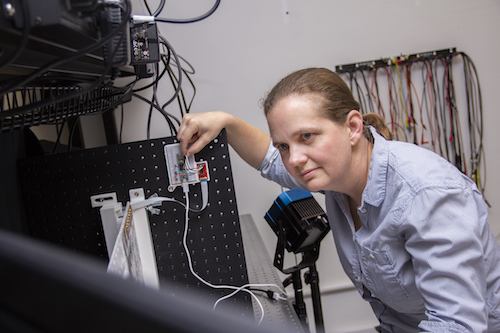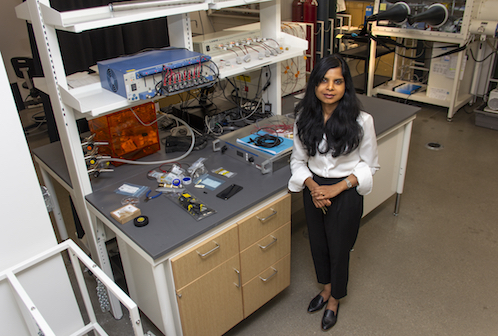Bergbreiter, Jayan win Army DURIP awards
Marika Yang
Jun 25, 2019

Source: College of Engineering
Sarah Bergbreiter directs the Micro Robotics Lab at Carnegie Mellon University.
Professor Sarah Bergbreiter and Assistant Professor B. Reeja Jayan, both in the Department of Mechanical Engineering, have received Defense University Research Instrumentation Program (DURIP) awards from the U.S. Army. The DURIP award financially supports university researchers with the purchases of vital laboratory equipment for current research and the development of new ideas and techniques.
Bergbreiter leads the Micro Robotics Lab at Carnegie Mellon University, and is focused on research at the intersection of microsystems and robotics. The lab uses microsystems knowledge to design and fabricate small scale sensors and actuators for larger robots, as well as small mobile robots. The DURIP award will specifically support a multidisciplinary project in which the researchers are studying rapid motion in small scale systems like jumping insects or mantis shrimp that is often driven by springs.
“Dr. Bergbreiter’s research is a critical component of a multidisciplinary research program that is seeking to translate some of the most remarkably fast and sudden dynamics seen in natural organisms to future autonomous systems,” said Dr. Samuel Stanton, program manager at Army Research Office, an element of Combat Capability Development Command’s Army Research Lab. “The new knowledge that will come from Dr. Bergbreiter’s experiments will provide the Army with the science necessary to design small-scale autonomous systems capable of ultra-responsive movements across all types of terrain.”
Bergbreiter was funded to purchase a sensor to measure forces in these fast, small-scale systems. The sensor is about 10 centimeters in length, and can be placed inside a scanning electron microscope.
“Because the systems that we are studying are so small and fast, we require a special sensor in order to measure these very small forces very quickly. This DURIP is funding a system to measure those forces,” said Bergbreiter. “The instrument that we chose can fit it into a lot of different systems, which ultimately benefits a lot of projects in the lab.”

Source: College of Engineering
Reeja Jayan runs Carnegie Mellon's Far-From-Equilibrium Materials Laboratory.
While the DURIP award funds the purchase of equipment that is currently on the commercial market, it also supports the creation of a new piece of equipment for a specific goal. Jayan’s project falls under this category. Her lab synthesizes ceramic materials using electromagnetic fields and investigates how these fields influence the atomic structure and properties of these materials. However, with the current equipment and methods, she cannot conduct such mechanistic studies (in situ) as the materials are growing, and instead do it after the fact (ex situ).
To address this problem, Jayan and her lab are creating a tool, called COMPACT, by “plug and play” integration of non-destructive optical tools, such as Raman spectroscopy, to monitor the structural, phase, and chemical transformations in materials. This is a completely novel idea, and will be the first of its kind.
“The tool will tell us dynamic changes that are happening “live” during the field-assisted materials synthesis process, as opposed to just giving us information at the very end,” said Jayan.
The Army is interested in exploring field assisted synthesis processes for the fabrication of advanced structural and functional materials, but development of these processes requires insight into the fundamental interactions occurring between fields and materials,” said Dr. Michael Bakas, synthesis and processing program manager at Army Research Office. “Professor Jayan's COMPACT system has the potential to characterize those interactions in detail and provide the data needed to advance field assisted processing methods.”
With the DURIP award, they are currently purchasing the appropriate materials and building the equipment. Though the COMPACT project is still in its early stages, Jayan is hopeful that in the future they can work with manufacturers to develop a commercial product.
For Bergbreiter, the DURIP award funds a piece of equipment that makes her research much more efficient. Without the special sensor, she would have to measure things by custom means, taking up an enormous amount of time and resources.
“I’m excited about all the things we can measure with it,” she said. “Because we have a number of collaborators on this one project, hopefully it will support some of their research as well, and they’ll be able to come and use the equipment. It will have a lot of potential benefits.”
The annual DURIP award process is highly competitive. The program is administered through a merit competition jointly conducted by the Army Research Office, Office of Naval Research, and Air Force Office of Scientific Research. The department seeks specific proposals from university investigators conducting foundational science and engineering research of importance to national defense.
Media contact:
Lisa Kulick, lkulick@andrew.cmu.edu